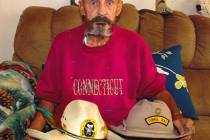A Roosevelt still lauding GI Bill
The GI Bill that provides financial assistance for education is one of the more successful government programs ever put into action.
Vietnam veterans were able to take advantage of the bill in the 1960s when it had changed little from its inception for World War II veterans. In my case, after Vietnam I attended junior college and later law school, earning an Associate of Arts degree and a Bachelor of Laws degree, respectively. I probably could have come up with the tuition on my own, but it certainly would have been a hardship. And I might still be paying off my student loans today.
The details and benefits of the GI Bill have changed during the years, but they still are the gold standard for Veterans Affairs programs. For example, veteran Jon Bellum received his college education in the early 1990s, thanks to the GI Bill. Now, on a daily basis, he sees the effect of the modern version — the post-9/11 GI Bill.
“One of the driving points of joining the National Guard in the late 1980s was to get the Montgomery GI Bill, which provided a substantial contribution to my tuition, provided me the opportunity to both serve but then also come out of the University of South Dakota without any debt,” said Bellum, senior vice president and provost at Colorado State University, Global Campus. “Now, working with students, our goal is to help them get their education and come out with the least amount of debt. The GI Bill has — at our institution — played an important part in all of that.”
Bellum is among the estimated 20 million American veterans who have received assistance toward education as part of the Servicemen’s Readjustment Act of 1944, the original GI Bill, or the updates that have followed. The legislation — drafted by American Legion Past National Commander Harry Colmery — created the U.S. middle class, revolutionized higher education and dramatically increased homeownership in America, according to the legion.
The bill was signed into law 70 years ago on June 22. To honor that landmark anniversary, the American Legion recently hosted a celebration for about 100 policymakers, veterans and others at the Microsoft Innovation &Policy Center in Washington, D.C. American Legion Executive Director Peter Gaytan put the law’s effect into perspective: “That piece of legislation has been called the most important piece of domestic legislation in the history of this country. And it’s true. It created the middle class. It gave this country a backbone to build upon, and you see that in your grandfather’s success, your father’s success … If you do what is right, you will get what you deserve.”
The Roosevelt family has been in American politics for decades. Theodore occupied the White House years before his cousin Franklin, the U.S. commander-in-chief for most of World War II. Other Roosevelts have served in Congress.
Today, one of their relatives has spoken out in praise of the GI Bill and its effects on the nation. Not only did the GI Bill revolutionize higher education, it made homeownership possible for millions of Americans, said Theodore Roosevelt IV, chairman of the American Legion’s 100th Anniversary Honorary Committee.
“It gave affordable home and business loans,” he said. “It democratized American education. And the impact of that is just incalculable. It gave us the middle class, the world’s largest middle class. It precipitated the creation of a thriving, vibrant housing industry. And we, as a nation, have more than two-thirds of our population living in homes that they own. That’s a great achievement that the American Legion and the GI Bill can take some credit for that.”
Looking ahead, Roosevelt pointed out that upcoming demobilizations will mean 1.2 million service members will be returning to civilian life. “And we better make darn sure that we are prepared to give them what they deserve for what they have done for us.”
That’s where the post-9/11 GI Bill comes in, which allows veterans to transfer benefits to a spouse or dependent under certain conditions. “I think what is important is how the legion over the years has kept it as part of every service members’ ability to go to school,” Bellum said. “And now it is an important part of their children’s legacy.”
Vegas PBS Enters Veterans Service Sector
I’ve often spoken out about the advent of new veterans service organizations seemingly coming out of the woodwork every month or so. It’s not that many of the new groups do not do good work, but in several cases they duplicate what the major veterans nonprofits are accomplishing.
The American Legion, Disabled American Veterans, Veterans of Foreign Wars, Military Order of the Purple Heart and numerous others already provide great work for veterans and their families. But one new local player may be an exception to the crowded field, and will hopefully have a large impact because it is a media company. VegasPBS, under the direction of General Manager Tom Axtell, has the ability to reach thousands of veterans and dependents through its televised offerings.
He recently wrote in the company’s corporate magazine that local support of public television “provides a unique opportunity to pay tribute to the profound heroism of all who served and sacrificed for our country and to raise awareness for the complex issues facing the members of our military and their families.”
At a press event I attended that screened a documentary about the personal lives of service members returning home from war (“Coming Back With Wes Moore”), VegasPBS noted that the station will provide veterans-specific services and will be rolling out resources to serve veterans and their families. Services reportedly will include grant-funded career testing, job fairs for vets, family reunification resources and online career certification programs to assist veterans as they re-enter the workforce.
As the program develops, it could prove to be a very positive addition for helping veterans in Southern Nevada. For more information, go to VegasPBS.org/Veterans.
Journalist and author Chuck N. Baker is an Army veteran of the Vietnam War and a recipient of the Purple Heart. He can be heard each Thursday from 8-9 p.m. on “The Veterans Reporter Radio Show” on KLAV 1230 AM.











